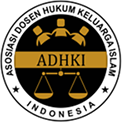IMPROVING ISLAMIC ECONOMIC INSTITUTIONS THROUGH EMPOWERING HUMAN RESOURCES MANAGAMENT (HRM) BASED ON IBNU KHALDUN’S THOUGHTS
(1) PASCASARJANA IAIN SYEKH NURJATI CIREBON
(*) Corresponding Author
Abstract
ABSTRACT
Ibnu Khaldun in his masterpiece of Muqaddimah rationalizations led us to understand how organizations can fall or be led to decline, not so much due to the external forces at work but rather due to the internal forces, which in today’s management views is something within our control. Everyone within the organization should be given their due respect and worth so that they could work together to ensure the success of the organization. In this age and time, justice must be seen to be done in order to create an orderly and harmonious society. Ibn Khaldun pointed out correctly when he compared and contrast the marked difference between the simple and pastoral life of the Bedouins and those of the sedentary society of whom the latter’s decline was due to internal factors such as greed and excesses that led to their decline and eventually the downfall of the Muslim empires. In the end of the day, based on Ibnu Khaldun’s thougts, this study is potentially useful to increase knowledge about the contribution of Islam in Islamic economic institution management. This will be an important reference source for those who learn Islam and management for those who will conduct further research in this field.
Keyword:Â Islamic economic institutions; empowering; HRM.
Keywords
References
Abdul Rahman, Zuriah. Ibn Khaldun’s New Science and Its Contribution to the Social Sciences and Risk Management, no. April (1997): 1–20.
———. Ibn Khaldun’s New Science and Its Contribution to the Social Sciences and Risk Management, 1–20 (1997).
Aycan, Zeynep. The Interplay between Cultural and Institutional/structural Contingencies in Human Resource Management Practices. International Journal of Human Resource Management 16, no. 7 (2005): 1083–1119. https://doi.org/10.1080/09585190500143956.
Azeez, Shaheeb. Human Resource Management Practices and Employee Retention: A Review of Literature. Journal of Economics, Management and Trade 18, no. 2 (2017): 1–10. https://doi.org/10.9734/JEMT/2017/32997.
———. Human Resource Management Practices and Employee Retention: A Review of Literature. Journal of Economics, Management and Trade, n.d. //doi.org/10.9734/JEMT/2017/32997.
Chapra, M.Umer. Ibn Khaldun’s Theory of Development: Does It Help Explain the Low Performance of the Present-Day Muslim World? Journal of Socio-Economics, 2008.
Chavance, Bernard. John Commonss Organizational Theory of Institutions: A Discussion,. Journal of Institutional Economics 8, no. 1 (2012): 27–47. //doi.org/10.1017/S1744137411000336.
Hodgson, Geoffrey M. Institutional Economics into the Twenty-First Century. Studi E Note Di Economia, no. June 2008 (2009): 3–26.
———. Institutional Economics into the Twenty-First Century. Studi E Note Di Economia, 2009.
Khaldoun, Ibn. مقدّمة ابن خلدون Muqoddimah Ibn Khaldoun, ‘Abdu Ar Rahman Ibn Mohammed Ibn Khaldoun Al Hadroumy. Arabic Translation. Saaid.net, at .al-Mustafa, 2018, 34.
M.Gross, Annegret. Search Engine Behavior and Satisfaction: A Survey-Based Study among Users in Malaysia. IOSR Journal Of Humanities And Social Science (IOSR-JHSS), 2016. //doi.org/10.9790/0837-2106010106.
Siswanto. Improving Competitiveness of Islamic Banking HUman Resources Through Implementation of Quran-Based HRM Practices. European Journal of Business and Social Sciences 3, no. 3 (2014): 1–13.
———. Improving Competitiveness of Islamic Banking HUman Resources Through Implementation of Quran-Based HRM Practices. European Journal of Business and Social Sciences, 2014.
Zubair, Hasan. Islamic Banking at the Crossroads: Theory versus Practice. In M. Iqbal & R. Wilson. Islamic Perspectives on Wealth Creation, 2005, 12–13.
DOI: 10.24235/inklusif.v4i2.4991
Article Metrics
Abstract view : 169 timesRefbacks
- There are currently no refbacks.
 |  |  |  |  |
 |  |  |  |
|












.png)